Signalian
PDF THINK TANK: CONSULTANT

- Joined
- Aug 18, 2015
- Messages
- 10,608
- Reaction score
- 305
- Country
- Location
By Sana Ejaz
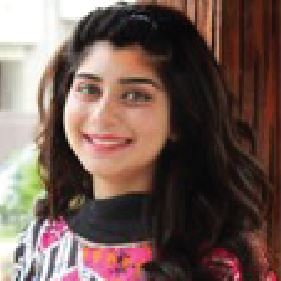
On a fine Tuesday morning around 9 a.m. I walked into the Army Sports Directorate (AS Dte) to interview the sportswomen who are enrolled there. Walking into the area I came face-to-face with the site of women and men practicing archery in the front lawn. As the interview progressed I interacted with several other sportswomen engaged in training for their respective sports under the guidance of their coaches. The significance of AS Dte’s work dawned upon me as I learned through each conversation about how it uplifts them and supports their hope to participate in national and international competitions. The AS Dte’s initiative is a reflection of the stance and belief of the Pakistan Army which supports the empowerment of women not only those who wear uniform but also in all other areas. The organization’s commitment towards this initiative is one which serves as evidence to the nation’s progressive spirit which does not differ between men and women, rather believes in ensuring that equal opportunities are provided to all, without any discrimination. The point of pride for the Directorate comes from its active efforts of representing the country’s women in the arena of sports at both national and international level. The strides made by this institution can be gauged from how the number of women under the patronage of the Army Sports Directorate has increased from 80 in 2015 to around 220 in 2018. These women participate in twenty-five sports ranging from archery to wushu. Their best performing teams include that of swimming, taekwondo, wushu, archery, baseball, cycling, volleyball and basketball among others.
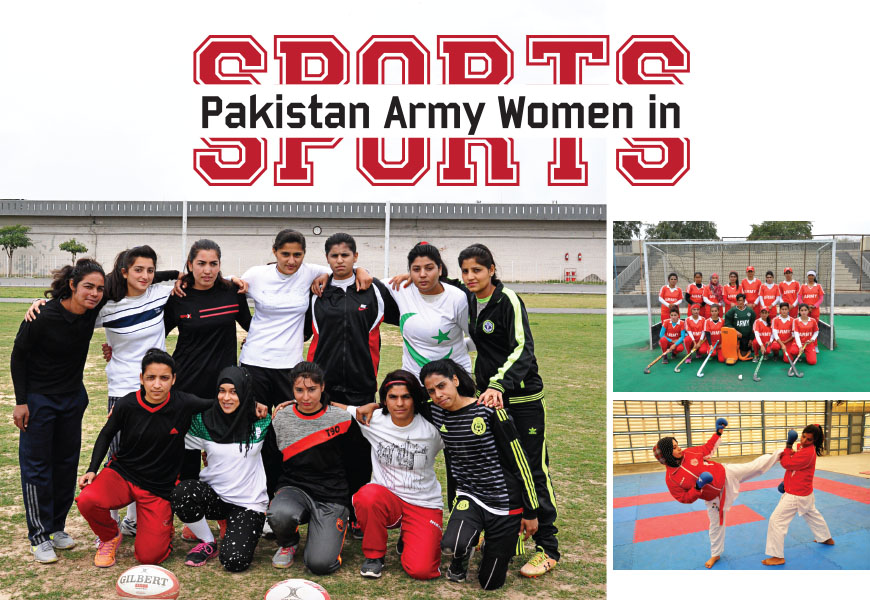
Means of Selection
The efforts of the recruiters and coaches is best described in the words of Bushra Rashid, a player in the Directorate’s women’s Rugby team who has won a silver medal while competing nationally, she explained that the role played by the coaches, recruiters as well as other female athletes of the organization is critical not only in the training period but specially in the initial phases due to their help in convincing their families and guardians for allowing them to train and compete. She stated that a team without a supportive coach is like a car without a driver, bound to crash. There are different means employed by the Directorate for the purpose of selecting and inducting women into its program. One important method is that of monitoring the inter-provincial games to recruit female players in different games. Another method involves recruiting sportswomen from villages and other areas. The physical fitness, training and skill of these women is gauged in order to come to the decision of whether or not to recruit them. An important point for consideration on which the Directorate does not compromise is the passion and love for the game which the selected athletes hold. A great feat and difficulty for the recruiters are the selection of players for a team sport. The challenge lies in the critical nature of recruiting individuals who can be successfully gelled as team so that their performance in team sports like volleyball, basketball, rugby and likewise is not compromised. Saba, a national player on the Directorate’s volleyball team, stated that their ability to perfect their teamwork comes from the guidance of their coaches and the long hours that the teams put in to practice their form and harmony. The model of recruitment and training is based upon undertaking physically fit individuals with their raw talent and transforming them into professional players through rigorous training and skill development.
Training and Trajectory of Improvement:
There are 11 training sessions which are held in a week. These training sessions and special training camps, organized prior to a competition, have proved to be extremely beneficial with comparison charts showing an increase in the player’s performance and physical condition in the last 2 years alone. Players put their all in training under the guidance of their coaches and mentors, competing at both national and international levels with their aspirations for winning gold for their country. To describe the importance of training the Director AS Dte Brigadier Ghulam Jilani aptly quoted Stephen Covey, “The law of the farm operates in all facets of life and there’s no way to fake a harvest.” Just as Covey said, in the case of sportswomen a training period is required for them to grow, attain their optimum physical condition and to effectively learn, adapt and hone their skills.
Their passion and love of the game allows them to power through with their demanding training and excel in the performance they give. To raise not only the participation of women athletes but also their skills it is imperative to invest in them and to polish them so that they can go for gold and represent their country at all levels with pride and preparation. The sportswomen of the Directorate compete at local, national and international level, showcasing their skills and drive.
Barriers
The issues most commonly faced by female athletes in our country are that of societal pressure and family strains with regards to the traditional gender roles. Since training and competing requires going to different camps around the country or outside of the country, many parents do not feel comfortable in supporting their daughters to participate in them. This difficulty was echoed by wushu players Zahra and Kulsoom who find familial support–particularly paternal support–imperative in such a situation. Despite the Directorate’s efforts and intentions the regrettable reality is that their female athletes have to leave this all behind and return home after the contract ends. However, in a bid to support them and to contribute to their flourishment, the Directorate provides them with insurance after their athletes have peaked to give them financial support. There is also an ever-present worry for recruiters that the women they have enrolled in their training programs and teams may not come back after their vacations/off-season. Their return is most likely hampered either due to marriage or family opposition. Nor is there a guarantee that the physical condition and diet of their female athletes will be maintained. Some girls face difficulties in joining the field of sports owing to sexist stereotypes and negative assumptions of women breaking the assumed characteristics of an “ideal” woman or daughter. While talking to Saba Sultan who is not only an international Kabaddi player but who also has experience in playing handball she stated in detail about the need to brave through the criticisms, the hardships and the failures as one’s passion for the sport and hard work can turn the game in their favour. She further stated that while coaches and institutions are important, the government’s support is critical for sports to flourish in Pakistan as they can ensure that competitions are not delayed or postponed and are held in a timely and safe manner. Saba emphasized the need for women to be strong and to not shy away from criticism, saying that “a woman’s dignity is reflected by her strong character”.
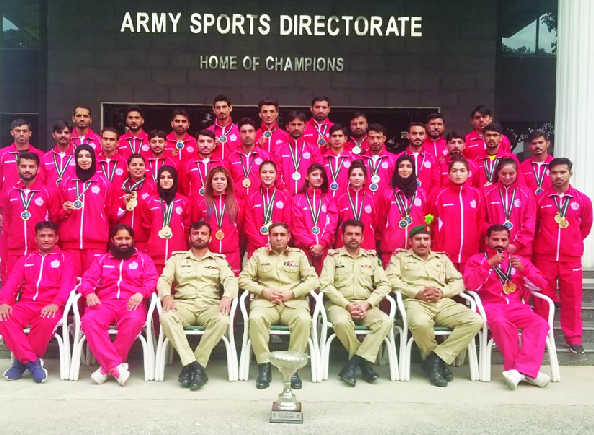
Services and Provisions
The Directorate provides the female athletes with hostels and transport facilities during their stay in the training period. Their hostels, comprising two buildings, are equipped with mess, heating/cooling facilities, and entertainment. To give them a reprieve from their packed schedule trips are also organized. During their stay at the facility, the athletes are given a special diet and they train in the presence of coaches, nutritionists and doctors whose objective is to ensure their athletes’ healthy diet, physical strength and safety. Medical insurance is also provided to the athletes which covers their injuries. To contribute to the development of their athletes and to practice the spirit of healthy competition, routine friendly matches are held between male and female athletes. During their participation in the competitions, the athletes are provided with costumes, kits, accommodation and transport. These female athletes not only gain physical empowerment but also financial independence with the monthly stipend that is provided to them.
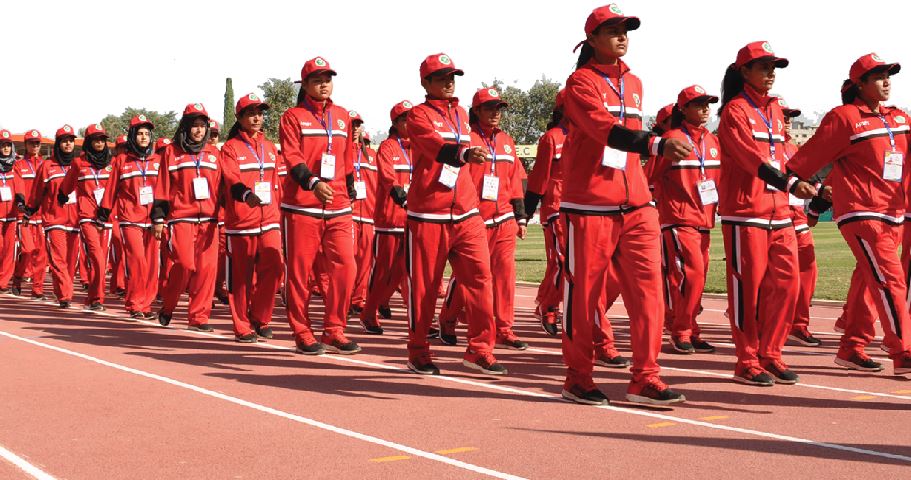
Importance of Sports
Sports is an essential activity to pursue as it improves the physical and mental fortitude of any and all persons who practice it. There is no one who argues against the positive impacts that participation in physical activities bring to a person. The most apparent impacts of sports include a boost in self-confidence, initiative taking abilities, decision-making skills, healthy use of energy, physical fitness and discipline. For women in particular, the importance of sports goes beyond the aforementioned benefits resulting in financial autonomy, breaking gender-based stereotypes, making a place for themselves in the society, gaining exposure, and finding ways to support themselves, their aspirations as well as their families. Sports also equip women with the physical ability and mental strength to fight against sexual and gender based violence. Their participation in varied areas deemed traditionally limited to or dominated by men contributes to more progressive and changing views on the gender-discrimination and feminism debate hence setting off the need for sustainable policies for the creation of a gender positive environment. Kanwal Naz and Amna Rasheed are both judo players where the former is a bronze medal judo player who progressed from competing at club level to district and national level and eventually progressing to international level. The latter has experience in other areas like weightlifting and powerlifting as well. Both women are of the view that family support in pursuing sports is important as sports like judo, martial arts, weightlifting and the likes contribute to good health while also teaching women self-defence.
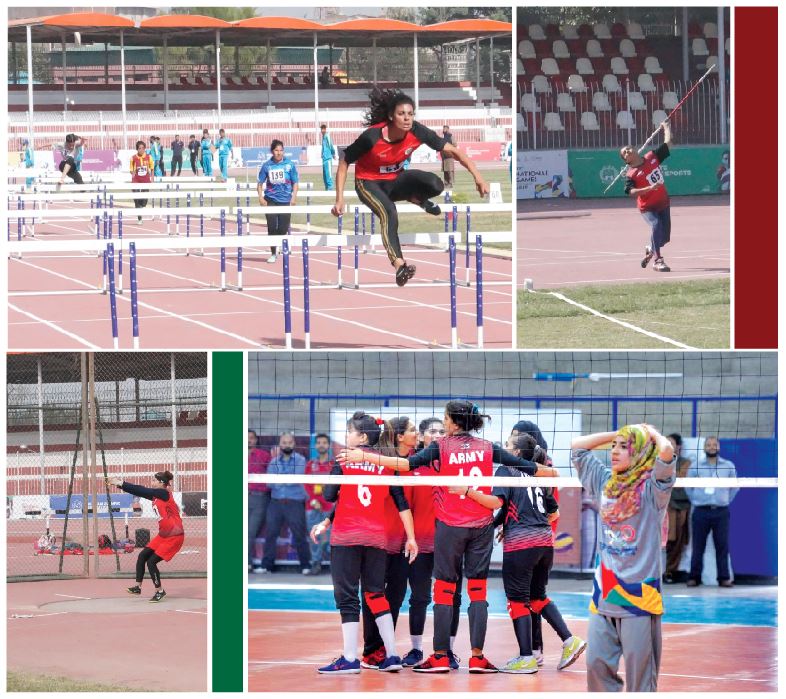
Pakistani Role Models
There are many women who have competed at national and international levels in various sports and have not only proved their competence but that of Pakistan’s as well. Kiran Khan–an Olympic medal winning swimmer and Naseem Hameed–a track and field athlete who won gold at the South Asian Games in 2010–are just two names who have proved to their critics and naysayers that women are more than capable of excelling and surpassing in all areas, including physically strenuous areas of sports. Sabiha Zahid of Pakistan Army is yet another name in the list of women who proved women’s prowess in sports. She has won multiple awards including gold medal in women cyclist events of National Games in 2013 and a bronze medal while competing internationally in the South Asian Games held in India in 2016.
Gender equality can pay a lot of dividends for sports. Their benefits are many. It can lead to the improvement of diversity, attract more potential participants and pave the way for active participation in sports at all levels. The quality of the services delivered will also experience an exponential increase with women and other athletes being able to see more role models who are not defined or judged by their gender rather their skills and talent act as a measure of their greatness. Gender equality and diversification can mean for current and prospective athletes, both male and female, to learn newer approaches for preparing, planning and working towards a sports career. It can translate into increasingly safe and secure sporting environments where the authorities, organizers and other stakeholders are aware of how to handle the risks and prevent harm to the athletes. Pakistan is navigating its way through increasing awareness of sports and uplifting its athletes, its progress can be seen in young talents like Rubab Fatima and Pakeeza, two sisters aged 11 and 13 years, who have competed at national and international level respectively. Their love for gymnastics allowed them to power through their tough training and learn the craft in six months. Now with an experience of a year-and-a-half in gymnastics these sisters are more determined than ever before to represent their talent and their country at the international level and win the gold.
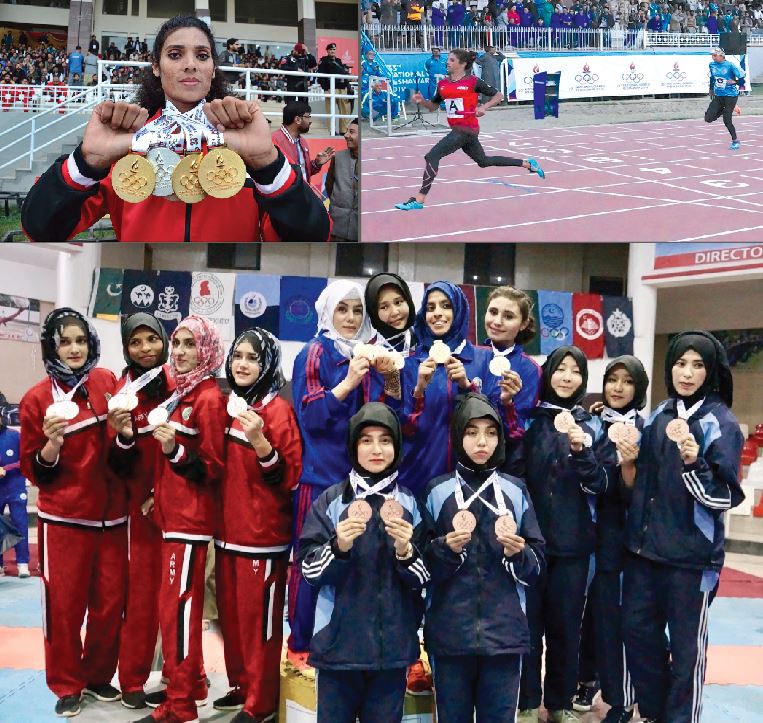
Many of the female athletes interviewed for this piece, like Poonam who is a basketball player at AS Dte, were of the view that exposure to sports training and competition at a young age is very helpful, however the lack of events for women or competitions in general can hamper interest and progress. For this reason if Pakistan is to benefit from the multitudes of advantages that sports offers to the human mind and body as well as to the society as a whole, efforts should be made to invest in holding serious physical education classes and competitions in schools, colleges and universities. The AS Dte’s work in the area of women empowerment through sports is a commendable one. It stands by the Pakistan Army’s belief of equal opportunities for all by investing in the skills of all its athletes and polishing their talent. The Directorate’s efforts have materialized in the form of recognition of the Pakistan Army’s female athletes who have won several gold, silver and bronze medals in both team and individual sports while participating in competitions both inside and outside of the country. Of course, these female athletes are the pride of not only their families and the Pakistan Army but also the pride of the nation whose achievements continue to raise Pakistan’s stature into further prominence.
E-mail: sanakhan0092@gmail.com
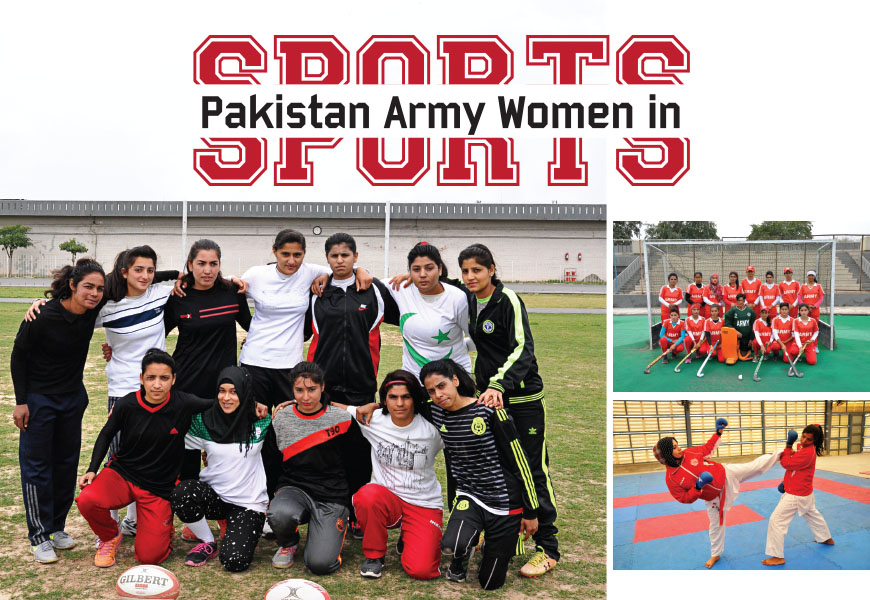
 www.hilal.gov.pk
www.hilal.gov.pk

On a fine Tuesday morning around 9 a.m. I walked into the Army Sports Directorate (AS Dte) to interview the sportswomen who are enrolled there. Walking into the area I came face-to-face with the site of women and men practicing archery in the front lawn. As the interview progressed I interacted with several other sportswomen engaged in training for their respective sports under the guidance of their coaches. The significance of AS Dte’s work dawned upon me as I learned through each conversation about how it uplifts them and supports their hope to participate in national and international competitions. The AS Dte’s initiative is a reflection of the stance and belief of the Pakistan Army which supports the empowerment of women not only those who wear uniform but also in all other areas. The organization’s commitment towards this initiative is one which serves as evidence to the nation’s progressive spirit which does not differ between men and women, rather believes in ensuring that equal opportunities are provided to all, without any discrimination. The point of pride for the Directorate comes from its active efforts of representing the country’s women in the arena of sports at both national and international level. The strides made by this institution can be gauged from how the number of women under the patronage of the Army Sports Directorate has increased from 80 in 2015 to around 220 in 2018. These women participate in twenty-five sports ranging from archery to wushu. Their best performing teams include that of swimming, taekwondo, wushu, archery, baseball, cycling, volleyball and basketball among others.

Means of Selection
The efforts of the recruiters and coaches is best described in the words of Bushra Rashid, a player in the Directorate’s women’s Rugby team who has won a silver medal while competing nationally, she explained that the role played by the coaches, recruiters as well as other female athletes of the organization is critical not only in the training period but specially in the initial phases due to their help in convincing their families and guardians for allowing them to train and compete. She stated that a team without a supportive coach is like a car without a driver, bound to crash. There are different means employed by the Directorate for the purpose of selecting and inducting women into its program. One important method is that of monitoring the inter-provincial games to recruit female players in different games. Another method involves recruiting sportswomen from villages and other areas. The physical fitness, training and skill of these women is gauged in order to come to the decision of whether or not to recruit them. An important point for consideration on which the Directorate does not compromise is the passion and love for the game which the selected athletes hold. A great feat and difficulty for the recruiters are the selection of players for a team sport. The challenge lies in the critical nature of recruiting individuals who can be successfully gelled as team so that their performance in team sports like volleyball, basketball, rugby and likewise is not compromised. Saba, a national player on the Directorate’s volleyball team, stated that their ability to perfect their teamwork comes from the guidance of their coaches and the long hours that the teams put in to practice their form and harmony. The model of recruitment and training is based upon undertaking physically fit individuals with their raw talent and transforming them into professional players through rigorous training and skill development.
Training and Trajectory of Improvement:
There are 11 training sessions which are held in a week. These training sessions and special training camps, organized prior to a competition, have proved to be extremely beneficial with comparison charts showing an increase in the player’s performance and physical condition in the last 2 years alone. Players put their all in training under the guidance of their coaches and mentors, competing at both national and international levels with their aspirations for winning gold for their country. To describe the importance of training the Director AS Dte Brigadier Ghulam Jilani aptly quoted Stephen Covey, “The law of the farm operates in all facets of life and there’s no way to fake a harvest.” Just as Covey said, in the case of sportswomen a training period is required for them to grow, attain their optimum physical condition and to effectively learn, adapt and hone their skills.
Their passion and love of the game allows them to power through with their demanding training and excel in the performance they give. To raise not only the participation of women athletes but also their skills it is imperative to invest in them and to polish them so that they can go for gold and represent their country at all levels with pride and preparation. The sportswomen of the Directorate compete at local, national and international level, showcasing their skills and drive.
Barriers
The issues most commonly faced by female athletes in our country are that of societal pressure and family strains with regards to the traditional gender roles. Since training and competing requires going to different camps around the country or outside of the country, many parents do not feel comfortable in supporting their daughters to participate in them. This difficulty was echoed by wushu players Zahra and Kulsoom who find familial support–particularly paternal support–imperative in such a situation. Despite the Directorate’s efforts and intentions the regrettable reality is that their female athletes have to leave this all behind and return home after the contract ends. However, in a bid to support them and to contribute to their flourishment, the Directorate provides them with insurance after their athletes have peaked to give them financial support. There is also an ever-present worry for recruiters that the women they have enrolled in their training programs and teams may not come back after their vacations/off-season. Their return is most likely hampered either due to marriage or family opposition. Nor is there a guarantee that the physical condition and diet of their female athletes will be maintained. Some girls face difficulties in joining the field of sports owing to sexist stereotypes and negative assumptions of women breaking the assumed characteristics of an “ideal” woman or daughter. While talking to Saba Sultan who is not only an international Kabaddi player but who also has experience in playing handball she stated in detail about the need to brave through the criticisms, the hardships and the failures as one’s passion for the sport and hard work can turn the game in their favour. She further stated that while coaches and institutions are important, the government’s support is critical for sports to flourish in Pakistan as they can ensure that competitions are not delayed or postponed and are held in a timely and safe manner. Saba emphasized the need for women to be strong and to not shy away from criticism, saying that “a woman’s dignity is reflected by her strong character”.

Services and Provisions
The Directorate provides the female athletes with hostels and transport facilities during their stay in the training period. Their hostels, comprising two buildings, are equipped with mess, heating/cooling facilities, and entertainment. To give them a reprieve from their packed schedule trips are also organized. During their stay at the facility, the athletes are given a special diet and they train in the presence of coaches, nutritionists and doctors whose objective is to ensure their athletes’ healthy diet, physical strength and safety. Medical insurance is also provided to the athletes which covers their injuries. To contribute to the development of their athletes and to practice the spirit of healthy competition, routine friendly matches are held between male and female athletes. During their participation in the competitions, the athletes are provided with costumes, kits, accommodation and transport. These female athletes not only gain physical empowerment but also financial independence with the monthly stipend that is provided to them.

Importance of Sports
Sports is an essential activity to pursue as it improves the physical and mental fortitude of any and all persons who practice it. There is no one who argues against the positive impacts that participation in physical activities bring to a person. The most apparent impacts of sports include a boost in self-confidence, initiative taking abilities, decision-making skills, healthy use of energy, physical fitness and discipline. For women in particular, the importance of sports goes beyond the aforementioned benefits resulting in financial autonomy, breaking gender-based stereotypes, making a place for themselves in the society, gaining exposure, and finding ways to support themselves, their aspirations as well as their families. Sports also equip women with the physical ability and mental strength to fight against sexual and gender based violence. Their participation in varied areas deemed traditionally limited to or dominated by men contributes to more progressive and changing views on the gender-discrimination and feminism debate hence setting off the need for sustainable policies for the creation of a gender positive environment. Kanwal Naz and Amna Rasheed are both judo players where the former is a bronze medal judo player who progressed from competing at club level to district and national level and eventually progressing to international level. The latter has experience in other areas like weightlifting and powerlifting as well. Both women are of the view that family support in pursuing sports is important as sports like judo, martial arts, weightlifting and the likes contribute to good health while also teaching women self-defence.

Pakistani Role Models
There are many women who have competed at national and international levels in various sports and have not only proved their competence but that of Pakistan’s as well. Kiran Khan–an Olympic medal winning swimmer and Naseem Hameed–a track and field athlete who won gold at the South Asian Games in 2010–are just two names who have proved to their critics and naysayers that women are more than capable of excelling and surpassing in all areas, including physically strenuous areas of sports. Sabiha Zahid of Pakistan Army is yet another name in the list of women who proved women’s prowess in sports. She has won multiple awards including gold medal in women cyclist events of National Games in 2013 and a bronze medal while competing internationally in the South Asian Games held in India in 2016.
Gender equality can pay a lot of dividends for sports. Their benefits are many. It can lead to the improvement of diversity, attract more potential participants and pave the way for active participation in sports at all levels. The quality of the services delivered will also experience an exponential increase with women and other athletes being able to see more role models who are not defined or judged by their gender rather their skills and talent act as a measure of their greatness. Gender equality and diversification can mean for current and prospective athletes, both male and female, to learn newer approaches for preparing, planning and working towards a sports career. It can translate into increasingly safe and secure sporting environments where the authorities, organizers and other stakeholders are aware of how to handle the risks and prevent harm to the athletes. Pakistan is navigating its way through increasing awareness of sports and uplifting its athletes, its progress can be seen in young talents like Rubab Fatima and Pakeeza, two sisters aged 11 and 13 years, who have competed at national and international level respectively. Their love for gymnastics allowed them to power through their tough training and learn the craft in six months. Now with an experience of a year-and-a-half in gymnastics these sisters are more determined than ever before to represent their talent and their country at the international level and win the gold.

Many of the female athletes interviewed for this piece, like Poonam who is a basketball player at AS Dte, were of the view that exposure to sports training and competition at a young age is very helpful, however the lack of events for women or competitions in general can hamper interest and progress. For this reason if Pakistan is to benefit from the multitudes of advantages that sports offers to the human mind and body as well as to the society as a whole, efforts should be made to invest in holding serious physical education classes and competitions in schools, colleges and universities. The AS Dte’s work in the area of women empowerment through sports is a commendable one. It stands by the Pakistan Army’s belief of equal opportunities for all by investing in the skills of all its athletes and polishing their talent. The Directorate’s efforts have materialized in the form of recognition of the Pakistan Army’s female athletes who have won several gold, silver and bronze medals in both team and individual sports while participating in competitions both inside and outside of the country. Of course, these female athletes are the pride of not only their families and the Pakistan Army but also the pride of the nation whose achievements continue to raise Pakistan’s stature into further prominence.
E-mail: sanakhan0092@gmail.com

Pakistan Army Women in Sports
On a fine Tuesday morning around 9 a.m. I walked into the Army Sports Directorate (AS Dte) to interview the sportswomen who are enrolled there. Walking into the area I came face-to-face with the site of women and men practicing archery in the front lawn. As the interview progressed I interacted...


